Existing User Log In
New User Registration
Register for a free account to gain full access to the VGChartz Network and join our thriving community.



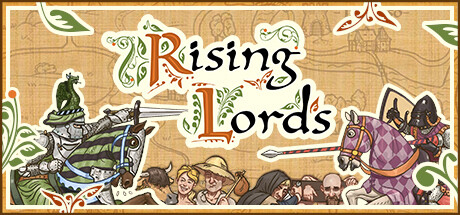

America - Front


America - Back

Argonwood
Strategy
 (Add Date)
(Add Date) (Add Date)
(Add Date) (Add Date)
(Add Date)
| Owners: | 0 |
| Favorite: | 0 |
| Tracked: | 0 |
| Wishlist: | 0 |
| Now Playing: | 0 |
Reviewer's Note: Rising Lords was reviewed on an Xbox Series S.
Is there a more perfect mix of time, place, and genre than the European medieval period and turn-based strategy? With its lords, ladies, knights, serfs, and peasants, it's a perfect canvas on which to create a video game focused on territorial expansion, resource management, and political intrigue. Ostensibly, that was the thought process behind Rising Lords, a labor of love from the small team at Argonwood, an indie studio based out of Cologne, Germany.
After almost four years in Early Access, Rising Lords landed on PC, Xbox, and Switch last month. Despite all those years of testing and tweaking, the game arrived in an unpolished state. In my 50 hours with the game on Xbox Series S, I encountered several game-ending crashes, related either to corrupted saves or memory issues. At certain junctures I had to return to a much earlier, uncorrupted save file, losing hours of progress in the process; at one point I simply couldn't proceed forward.
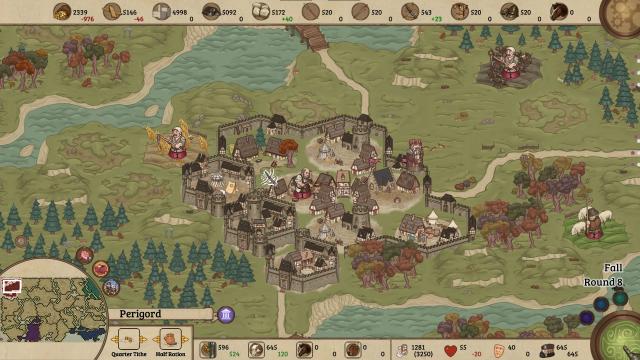
The good news is that the folks at Argonwood and publisher Deck13 have been incredibly responsive and active over the past 30 days, issuing at least two major patches to improve performance, remove bugs, and — in response to player feedback — update the autosave system and introduce a more relaxed difficulty option. Today, Rising Lords is in a much healthier state, even if error messages, glitches, and performance issues remain.
So, with that out of the way, what is the game all about? Rising Lords is a medieval turn-based strategy title where you control a plot of land and all the variables therein. You must attend to your peasants, grow crops, mine stone and iron, construct buildings, raise armies, and, eventually, strike out against neighboring regions. The game essentially boils down to two main spheres: the season-to-season management of resources & populations, and turn-based tactical battles between opposing armies.
Resource management is the best part of the game, once you scale a steep initial learning curve. At first, everything is rather intimidating, despite the presence of a tutorial that walks you through the basics. Eventually, however, it all starts to click. You'll soon ease into a slow-moving, surprisingly addictive cycle of strategic decision-making and asset allocation.
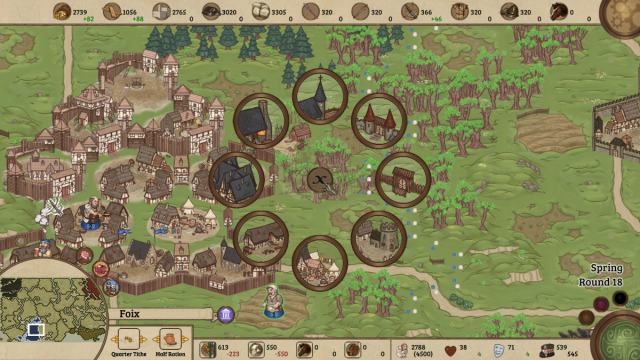
Here's how it works. As lord, you must see to the happiness and healthiness of your population by balancing taxes versus rations, by managing food variety, and by producing enough buildings to accommodate population increases (via immigration and birthrate). You must also deploy your population wisely. Peasants who sow wheat seeds in the winter must remain in the field until the following autumn to reap maximum rewards. Mines, quarries, and forests should be occupied to produce iron, stone, and wood used to build castles, inns, and garrisons — not to mention swords, spears, and arrows for your growing army. You must decide whether to devote a pasture to horses, which can augment your military force, or cows or sheep, which produce wool and milk, respectively.
Rising Lords is at its best during these periods of slow-burning strategizing. Seeing your realm and people gradually grow, and witnessing your decisions pay off over the course of months and years, is quite gratifying. Unfortunately, at times during the substantial single-player campaign, the game undermines this pacing. In certain chapters, war will come to your borders before you have enough time to grow your economy and armed forces, forcing you to load an earlier save and try again. In addition, many missions are timed, meaning you must rush to be at a certain place at a certain turn. You might not make it in time, or arrive with a woefully underpowered army. In either instance, it's an instant game over. There's a large amount of tedious trial and error here, particularly in the campaign.
Apart from technical issues, the campaign is perhaps the most disappointing thing about Rising Lords. It's a shame, because it starts off strong, at least after the tutorial section. There's ample time to build and expand, battles are small and manageable, and the map is tiny enough to keep you from being overwhelmed. As you proceed, though, you'll confront more deadlines, more surprises, and more difficulty spikes. Note: it's possible the more relaxed difficulty setting introduced in version 1.0.3 addresses these concerns.
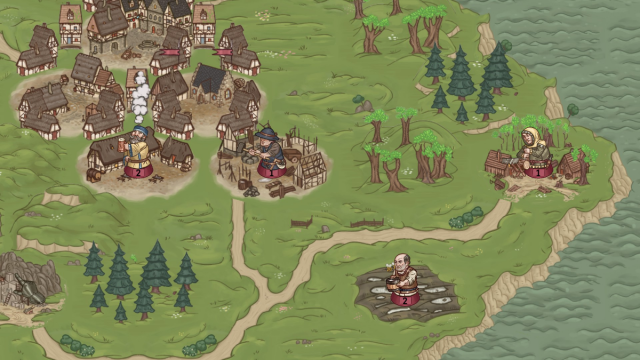
The most troublesome part of the campaign is the final chapter. It's lackluster for three reasons. One, there are far too many territories to manage at once. Where previous chapters wisely carved out certain areas in a bid to be feasible, the end game covers the entire continent. It is possible to set individual regions to "auto-govern", but the AI is simply not a replacement for human decision-making. Two, none of the mechanics evolve over the final hours of the game. You'll construct the same buildings, craft the same resources, and make the same decisions you did 30 hours earlier — only on a bigger scale. Three, the last stretch is filled with battle after battle, as you attempt to reclaim territory from enemy factions. Regrettably, combat in Rising Lords is a weak point.
Every combat scenario in the game takes place on a grid-based map. After you deploy your units — archers, knights, cavalrymen, peasants, etc. — you'll draw a few cards from your deck. You can then use these cards in battle to grant your forces buffs or weaken the opposing forces with debuffs. From there, each army fights in turn-based battles. On the surface, there appear to be a lot of tactical variables in each showdown. Certain terrain types and structures will give units advantages or disadvantages. Morale will dictate how reliable individual troops are in the heat of battle. And the right card played at the right time could save a unit from devastating damage.
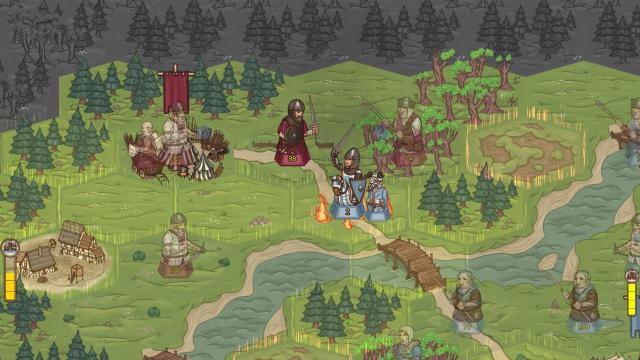
When you dig deeper, however, everything boils down to a numbers game. If your army is significantly outnumbered, you'll be steamrolled. If, conversely, you massively outnumber the enemy, you'll make short work of them, with only the most basic tactics. If you're evenly matched, prepare for a long, monotonous war of attrition. The best strategy is simply to raise an immense army and cut through all opposition. In a way, this is probably realistic to medieval warfare. But it's also unsatisfying from a mechanical perspective.
To be fair, if you take the fight to online multiplayer, you'll have to play a little more smartly. A clever human player with the right combination of troops, cards, and fortifications could, in theory, defeat a much larger force. Finding adversaries to compete in online battles or scenarios, though, might be tricky. Multiplayer lobbies seem vacant right now, so relying on random match-ups appears to be a lost cause. You're better off establishing password-protected lobbies with friends, or setting up matches via the official Discord.
Luckily, all the custom battles and scenarios available in online multiplayer are open as offline, local options. You can create custom battles with specific leaders, troop types, max XP for skill cards, and max army strength, and duke it out with the AI. Alternatively, you can play in 14 different wartime scenarios based on real world locations. It's up to you to set the team commanders, pick their personality type and strength, and form any alliances — for or against you. Not only that, but you can adjust limits on resources, weapons, and prosperity, and establish victory conditions and battle timers. When Rising Lords strays away from its single-player campaign and focuses on this sandbox-style gameplay, it becomes more attractive.
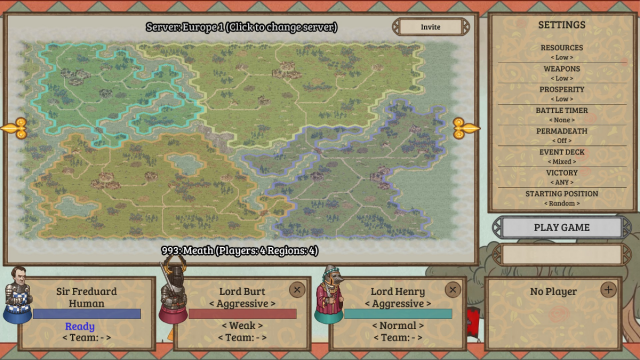
In addition to "Custom battle" and "Scenario" modes, the game offers "Challenge Mode" and a map editor. Challenge Mode is a special rogue-lite offering for experienced players. You're stuck on an island with limited resources. At the end of each turn, your army enters the battlefield, with each subsequent fight becoming more taxing. It's a neat little extra for folks who've exhausted the other game modes and wish to battle under the specter of permadeath. As for the map editor, it's precisely what it sounds like. Using the tools available, you can craft personalized battles and scenarios. The editing features aren't the most intuitive, but the customization options are near endless.
Throughout all of its offline and online modes, Rising Lords relies on a fetching tabletop role-playing aesthetic. From a top-down perspective you'll see all your peasants, represented by humanoid tops and playing piece bottoms. Depending on their location, you might see them hammering out swords, mining ore, tending to a flock of sheep, or simply quaffing ale. It's full of charm. Moreover, there are a lot of little graphical flourishes that elevate the game: military units falling apart like stacked wooden blocks upon defeat, or the way each season arrives with a flurry of snowflakes or windswept leaves across the screen.
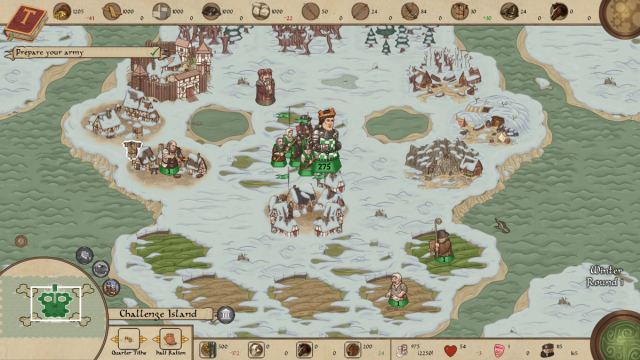
Performance issues show up to spoil those lovely artistic assets now and then, in spite of previous patches. At times, peasants will disappear from their patches of land, only to reappear soon after. At other times, particularly after seasonal changes and battle commands, the game will lag and stutter somewhat. A low level of jankiness remains in Rising Lords, despite the quick update work of Argonwood and Deck13.
The landscape of Medieval Europe goes perfectly with turn-based tactics and strategic gameplay. And although Argonwood has successfully tapped into that symbiosis, it hasn't quite made the most of it. While the resource management, city-building, and decision-making aspects of the game are highly addictive, they're often undermined by the strict structure and inflexible timelines of the campaign. The game's sandbox modes fare better, due to the freedom to play at your own pace. No matter the mode, though, combat isn't as evolved or nuanced as it could be, even if it looks great in action. All that said, the core of Rising Lords shows huge potential. With a better campaign, fewer technical hitches, and deeper combat options, it could be something special.









